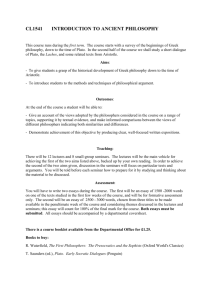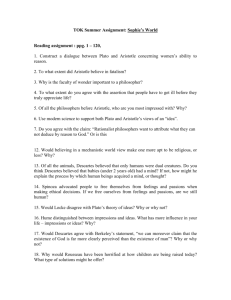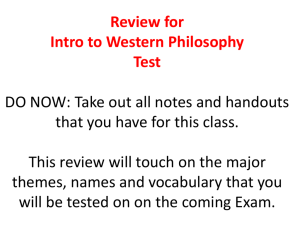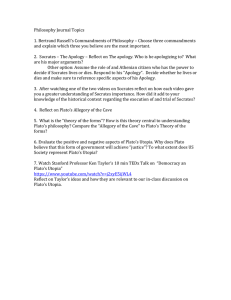Study Guide here
advertisement
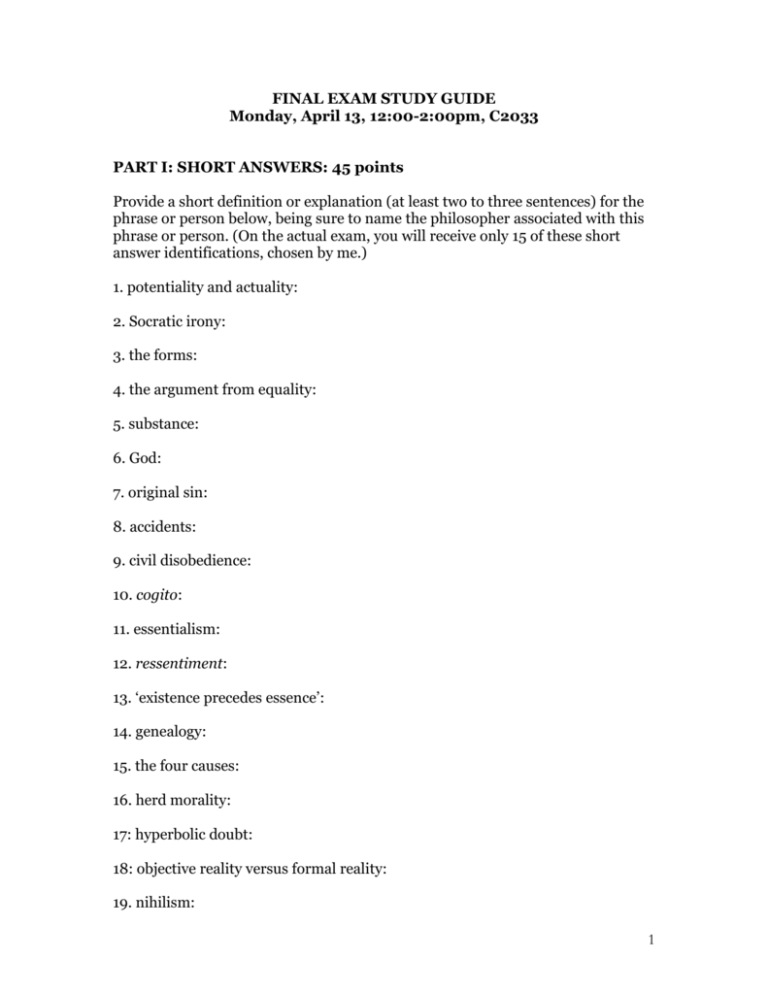
FINAL EXAM STUDY GUIDE Monday, April 13, 12:00-2:00pm, C2033 PART I: SHORT ANSWERS: 45 points Provide a short definition or explanation (at least two to three sentences) for the phrase or person below, being sure to name the philosopher associated with this phrase or person. (On the actual exam, you will receive only 15 of these short answer identifications, chosen by me.) 1. potentiality and actuality: 2. Socratic irony: 3. the forms: 4. the argument from equality: 5. substance: 6. God: 7. original sin: 8. accidents: 9. civil disobedience: 10. cogito: 11. essentialism: 12. ressentiment: 13. ‘existence precedes essence’: 14. genealogy: 15. the four causes: 16. herd morality: 17: hyperbolic doubt: 18: objective reality versus formal reality: 19. nihilism: 1 20. “The Other as such is posed by the One”: PART II: Answer two of the following essay questions. (Total value: 30%) God (15%) What is God? In this essay, you will describe three different renditions of the existence of God (mentioned in Aristotle, Augustine, Aquinas, Descartes, and Nietzsche). Who or what is God for this philosopher? Do we rationally prove its existence? How so? What are the differences, if any, in the approaches of these philosophers? The question of dualism in Descartes and Plato (15%): In this essay, you will compare Descartes and Plato on the question of dualism. First, define what is meant by dualism, then describe Plato’s position, laying out the distinctions he makes between the soul and the body, being specific to which dialogues in which he makes this discussion. In the next section, go through Descartes’ distinction between the mind and the body in The Meditations. Does he agree with Plato? Why or why not? If he agrees, say how he extends Plato’s thinking. If not, then say how this derives from a different philosophical approach. What is the difference, then, between the soul in Plato and the cogito in Descartes? The Individual and Society (15%): In this essay you will compare Martin Luther King, Jr. and Socrates on the possibility of civil disobedience. In the first part of your essay, describe and summarize Socrates’ arguments for or against escaping his punishment in the Crito. What are the charges against him? Why was he convicted? What does he tell Crito the correct thing to do in his case is? Be specific. Then show how MLK responds, in a way, to Socrates’ arguments. Does he agree or disagree? Why or why not? PART III (25%) What is philosophy? What is the difference between philosophy and sophistry or mere rhetoric? What does philosophy do differently than those who up to today take up our public squares with political speeches and so on? In this paper examine closely how three philosophers we have read describe their philosophical practice. One often feels after reading different philosophers that one doesn’t know the truth, that each one seems quite as good persuading us, such that many students in introduction to philosophy don’t know what to think by the end of it. Is there a difference between philosophy and rhetoric and if so, what is it? For each philosopher you mention, describe both the content of their philosopher and how this is linked to the method in which they take up philosophy. How are these philosophers different? Are you able to come up with a definition of philosophy that combines them all? 2 3

